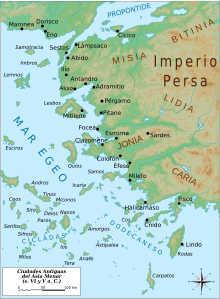This is an old revision of this page, as edited by 47.17.170.69 (talk) at 06:31, 21 November 2013 (Removed: "Ionians were *ugly* people, to which their" ). The present address (URL) is a permanent link to this revision, which may differ significantly from the current revision.
Revision as of 06:31, 21 November 2013 by 47.17.170.69 (talk) (Removed: "Ionians were *ugly* people, to which their" )(diff) ← Previous revision | Latest revision (diff) | Newer revision → (diff)
The Ionian Enlightenment was the set of advances in scientific thought, naturalistic explanations, and the application of rational and scientific criticisms to all spheres of life in Ionia of ancient Greece in 6th century BC. The Ionian Enlightenment received its origins in both ancient Mesopotamian and ancient Greek philosophy. The city of Miletus became the central area to which new philosophers and intellects would share and teach new ideas about their scientific outlooks and aims.
Ionia was an essential location for the enlightenment to prosper due to their political standing and communication networks. Ionia, in the 6th century BC, was not ruled by a powerful empire, but it was ruled by smaller, self-governing governments, with intellectual leading figures. Ionia’s political standing allowed the scientific ideas of the enlightenment to gain momentum without having serious restrictions.
Ionia's central location in the Mediterranean allowed for extensive trade with Asia Minor, Phoenicia, Egypt, Italy, and southern France. The Ionians were able to exchange both materials and ideas, especially with the eastern cultures, which helped develop the ideas of the enlightenment.
The enlightenment challenged the flawed morality of the gods, suggesting that the will of the gods did not cause the “bad” in the world; rather it was caused by natural means. Homer described that natural disasters were caused by the wrath of the gods, however during the enlightenment, a more scientific outlook uprooted superstition and replaced it with natural explanations.
Philosophers removed the gods from their reasoning, and concluded that things occurred naturally and independently from the will of the gods. Philosophers tried to explain the world through their senses, not through reasoning. Intellects thought that nature is a continuous becoming, to which everything is repeated or flows in cycles. Among the intellects of the enlightenment, three were considered the first natural philosophers: Thales, Anaximander, and Anaximenes. These three philosophers are notable for their attempts to explain the material origin of matter. Their answers identified a single substance (water, aperion, and air, respectively), thereby creating the monist school of thought. Their philosophies and ideas of the universe and matter were omnipresent throughout Ionia, and were used to formulate the Milesian School.
During the latter half of the 5th century BC, the prominence of the ideas and philosophies of the Ionian Enlightenment started to decline, heavily due to the Persian conquest of Ionia. Ionia stagnated culturally and economically. Many of the Ionian ideas and beliefs were adopted by the Athenians, which left very little evidence of the contributions made by the Ionian Enlightenment toward the formation of rational philosophies and ideas.
See also
References
- Ian Morris and Barry B. Powell, The Greeks: History, Culture, and Society (Upper Saddle River, New Jersey: Pearson Education, Inc., 2006), 172.
- Roger Penrose and Erwin Schrödinger, “Ionian Enlightenment,” in ‘Nature and the Greeks’ and ‘Science and Humanism’ (Cambridge: Cambridge University Press, 1996), 55.
- Shunys, “On Herodotus’ Histories,” Vitalect, Inc., http://www.shunya.net/Text/Herodotus/The Greeks.htm.
- Ian Morris and Barry B. Powell, The Greeks, 172.
- The Radical Academy, “The Philosophy of the Early Greek Naturalists,” Intute, http://www.radicalacademy.com/philnaturalists.htm#ionians
- Lindberg, David C. The Beginnings of Western Science. University of Chicago Press, 2007, p.28.
- Roger Penrose and Erwin Schrödinger, “Ionian Enlightenment,” 65.
- Rosalind Thomas, Herodotus in Context: Ethnography, Science and the Art of Persuasion (Cambridge: Cambridge University Press, 2002.) 10-11.